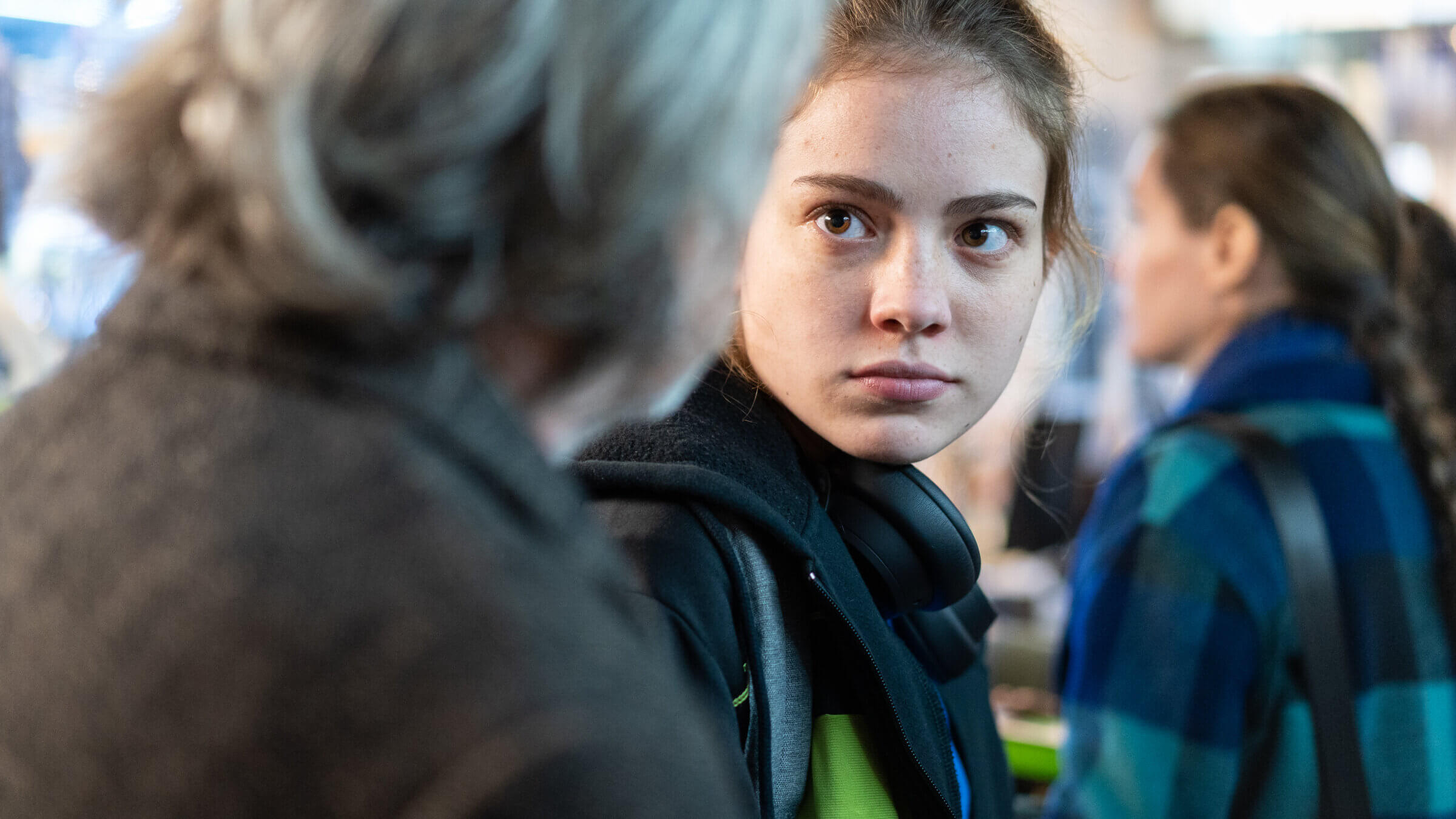Jewish film festival in Canada latest event to be canceled over ‘security concerns’
Threats related to war in Gaza cited in calling off concerts, book talks, screenings and more

Victoria Eber plays Justine Sandberg in the movie The Man in the Basement. The French thriller about Holocaust denial was on the program for a festival of Jewish movies that was canceled in Canada. Courtesy of Greenwich Entertainment
Concerts, book talks and other cultural events are increasingly being canceled because of security concerns about protests over Israel’s war in Gaza.
The Playhouse Cinema in Hamilton, Ontario, about 40 miles from Toronto, became the latest venue to call off a Jewish-themed event when it announced Tuesday that the annual Hamilton Jewish Film Festival would not be held in the theater as scheduled in April.
The festival is sponsored by the local Jewish federation. “After receiving numerous security and safety related emails, phone calls, and social media messages, the Playhouse Cinema reached a difficult decision to postpone the Hamilton Jewish Federation’s venue rental,” the theater said on X. Owners of the theater did not respond to emailed requests for comment but said online that the theater’s mission is “to be a welcome home to a variety of cultural groups.”
The federation said in a statement it was “outraged” that the event was canceled due to a “small number of complaints and threatening emails objecting to the fact that Israeli films are included in this year’s line-up.” The festival program included a thriller about Holocaust denial, The Man in the Basement, and The Boy, about life on the Israel-Gaza border, made by an Israeli filmmaker who was murdered in Hamas’ attacks in Israel on Oct. 7. The federation promised to stage the festival later this year in its own newly renovated facility.
The federation said complaints received by the theater included “claims by a few individuals that any film produced in Israel is a form of ‘Zionist propaganda.’” Canceling the festival in response to such charges, the federation said, is “prioritizing the will of antisemites over an apolitical cultural festival that stands for artistic excellence and integrity.”
Nancy Spielberg weighs in
Producer Nancy Spielberg, who is Steven Spielberg’s sister, said by email that it’s “tragic” to see the Canadian film festival and other events shut down by “the violence and threatening demonstrations by some pro-Palestinian groups. How and why these protests are allowed to get so physical and out of hand is beyond my comprehension.”
Many of Nancy Spielberg’s documentaries have Jewish or Israeli subjects. She added that canceling Jewish-themed events for safety reasons “seems to be a reoccurring ‘excuse.’ Whether it is because they are concerned about security issues — which is actually a real concern — or a combination of ‘canceling’ Jews everywhere … It’s hard to tell.”
The theater’s decision was made public the same day Canada’s foreign minister, Melanie Joly, said the country planned to stop sending weapons to Israel. But it’s also one of many cultural venues — in many countries — to call off events connected to Jewish creators in the aftermath of Hamas’ Oct. 7 attacks on Israel and Israel’s subsequent war in Gaza.
One of the biggest celebrities impacted by these cancellations has been singer Matisyahu, whose shows have been called off in Tucson, Arizona; Santa Fe, New Mexico; and Chicago. The venues have cited safety concerns and staff shortages, but they refused to host the events even when Matisyahu offered to pay for security himself.
“The staff at these venues refused to come to work, forcing cancellations,” Matisyahu said on X. “They do this because they are either anti-Semitic or have confused their empathy for the Palestinian people with hatred for someone like me who holds empathy for both Israelis and Palestinians.” He added that it’s a “sad day when dialogue with those you disagree with is abandoned for hate mongering and silencing artistic expression.”
A variety of opinions
Other venues have canceled artists with a variety of opinions on the war. Dauood Naimyar, who has made jokes critical of Israel, had his two-night show canceled by the Dallas Comedy Club. Stranger Things actor Brett Gelman, on tour to promote his short story collection The Terrifying Realm of the Possible: Nearly True Stories, said several bookstores canceled his talks because of his support for Israel.
Some bookstore owners disputed Gelman’s characterization of why they canceled, though: Book Passage in San Francisco cited unspecified remarks Gelman made disparaging other ethnic groups, and Los Angeles’ BookSoup said “the threats and expressed concern” over Gelman’s appearance had escalated into a “safety risk we weren’t willing to take.”
Jewish up-and-comers have been impacted by cancellations, too. Josh Dolgin, a performer whose skills include puppetry, accordion-playing and Yiddish, responded on X to a post about the Canadian film festival being called off by saying the problem is “real.” He added: “I’ve lost 3 gigs this summer for canceled festivals that have ‘Jewish’ in the title.”
Franky Bernstein, who organizes what he calls “Nice Jewish” parties, said on Instagram he had to cancel one of the events in Miami earlier this year after hearing from “a lot of not-so-nice” people. He added that ever since Oct. 7, he’d “been incredibly stressed out about doing these, mainly for safety reasons,” and that he hoped to resume the parties with better security and more discreet advertising about location and other details.
The Foundation for Individual Rights and Expression, a nonprofit civil liberties group, calls the cancellation phenomenon a “heckler’s veto,” in which a few people decide for everyone what can be said and heard.
“When these venues cave to mob censorship demands,” FIRE said in a recent statement, “they not only undermine the values of free artistic expression, they also deprive the audience of hearing the message or performance they paid to hear.”
















